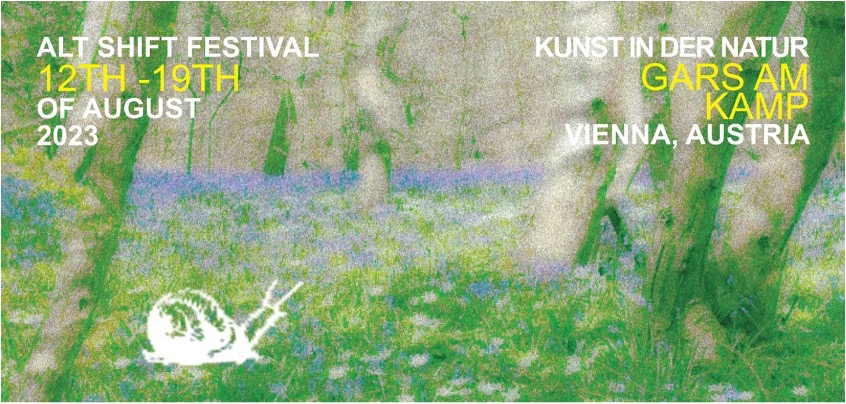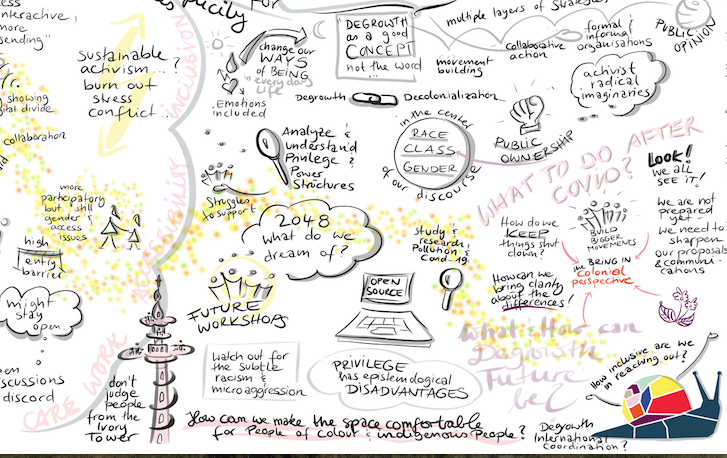COVID-19 has had many effects. Among others, it created a pause, putting non-essential economic activity on halt. A pause that has exposed the numerous weaknesses of growth-centred, globalised economies. A pause that created space for a range of suggestions, a tasting of alternative futures from different parts of the political spectrum, including nationalism, surveillance and austerity on the one hand, and transformative approaches to social and economic systems on the other. This new discursive space of possibility, the Degrowth Vienna 2020 organising team agreed, would benefit from an injection of ideas from the degrowth movement. Since the Vienna Conference had been dedicated to discussing strategies for social-ecological transformation, hence focussing explicitly on theoretical considerations related to strategy, as well as concrete steps towards profound social-ecological change, it appeared intuitively strategically appropriate to hold the conference despite and because of COVID-19. To add to the mix of discourses, the conference that had been planned as an in-person event between 29 May and 1 June 2020 was – after more than 18 months of preparatory work – shifted online. In this article, I will try and paint a picture of the conference, which will by no means capture it in in its entirety. It is rather an attempt at conveying an impression, consisting of several snapshots, the seeds sown, and some of the directions the degrowth movement might take from here. Degrowth Vienna 2020: A snapshot The conference opening coincided with a Friday morning, an admittedly suboptimal choice in a work-centred society. Nevertheless, over 1000 people gathered to listen to the opening panel. When, in the panel survey, 98% of the participants agreed that it was time for the degrowth movement to shift its focus to concrete strategies for transformation, it became clear the conference carried an air of commitment to change. Following the introductory panel, lively discussion continued in the chatrooms of the conference’s Discord server, reflecting the curious and active atmosphere among the participants, of which there were over 4000. Discord, a communication platform once developed for gamers, served as the conference’s home base, allowing participants to deepen discussions in session-specific channels and connect in the virtual community area. Moving the conference online was an experiment. The online format enabled the conference to be both flight-free (compliant with the no-flight policy, which the conference organising team had set up prior to COVID-19) while enabling participation from different parts of the world, hence rendering the conference less Eurocentric. On the other hand, online conferences are not necessarily more inclusive on all levels: challenges such as connectivity, time differences, computer-literacy, and basic access to technology preclude participation for many. Similarly, the quota of tickets for marginalised groups as part of the offline conference could not be translated into the online format. Nevertheless, the online format allowed us to convert initial venue expenses into a removal of participation fees, and to host four times as many people as we would have had the capacities for with an in-person format. Seeds Sown The role of strategy - already highlighted at the last international degrowth conference in Malmö in 2018 - was discussed in greater depth at the Vienna Conference by linking to questions of institutional change, the role of the state in a degrowth society, social practices, and contributions from experiences in the Global South. Participants collectively explored the strategic terrain for the degrowth movement by inspecting possible transformations of food, mobility, work, housing and production systems, to name a few. Notably, Erik Olin Wright’s framework for anti-capitalist transformation strategies was repeatedly referred to as a means to better conceptualise and systematize degrowth strategies, which highlights a direction for future research, i.e. the role of strategies in the degrowth movement as well as the development of methods to evaluate them. Coinciding with the global resurgence of the Black Lives Matter movement, the conference allowed the degrowth community to collaboratively formulate a solidary statement and reflect upon their own mechanisms of exclusion. Predominantly academic and Eurocentric, it became clear that the movement must make an active effort to include a broader range of voices, and make room for the systematically marginalised. Degrowth must be decolonial(ised) if it aims to become a holistic transformative framework. More generally, the degrowth movement should seek to build deeper alliances with other movements concerned with social and environmental justice. The movement has, similarly, much to gain from extending further beyond the academic realm, uniting with radical workers’ movements in a common struggle, and co-developing strategies for local, democratic and ecologically sound production. Within the degrowth movement itself, a closer collaboration between theorists and practitioners of degrowth-inspired projects, currently still largely shaped by the dynamics of growth-centred economies, could help narrow the gap that revealed itself during the conference, and refine a common degrowth imaginary. Likewise, it became evident that the degrowth movement would benefit from improved internal coordination, and enhanced cooperation between different degrowth actors, i.e. degrowth.net, R&D, the Support Group, degrowth.info and other regional degrowth actors. During consecutive conference sessions hosted by degrowth.info, initial discussions on the future of the degrowth movement’s collective digital communications were facilitated. In two panels, a degrowth international was proposed, which could take the shape of a centralised platform, bundling communications, whilst facilitating decentralised action. Where to Go From Here The Degrowth Vienna 2020 conference was a mosaic of deep reflection, vivid exchange on the history of transformations and the role of strategies, as well as an exploration of imagined futures of mobility, housing, food systems, work, monetary systems, and intersectionality in a degrowth world. In addition, there were droplets of creativity sprinkled all over the conference in the form of live music, movie screenings, and collective poetry-writing: means of communication that the degrowth movement should further explore to broaden its community. Lessons learned, among others, were that the degrowth movement must put intersectional struggles at its centre, connect to other social and ecological justice-based discourses and movements, continue to foreground questions of strategy for the movement, and aim for greater coordination and collaboration across a growing movement. All in all, the Degrowth Vienna 2020 was – in the words of conference advisory board member - a “necessary and successful experiment”. An experiment that made visible the avid interest in alternatives to the current organisation of our economic systems; the numerous ways in which activists, academics and artists engage with questions related to social-ecological transformation; as well as the rainbow of knowledges out there, and the degrowth community’s commitment to render it even more colourful. There will be interesting debates to come in terms of the shape degrowth that conferences should take in the future, based on newly gained experience and successes with an online format. Less up for debate, it appears, is that the degrowth movement must prioritise the question of how in the coming years to advance its goals. We seem to have ample ideas for the what.

Alt+Shift is a combination of keys that allows us to open up a window of possibilities from the few keys that we are given in our keyboard. We need new tools and a new narrative, that must be altogether altering, alternative and altruistic.

On August 14th, an uprising of art installations and happenings emerged in the Old North End neighborhood of Burlington, Vermont. Two days later, they all disappeared. Through these art pieces, community members and local organizations explored today’s tensions and possible paths toward desirable futures. Burlington residents navigated the neighborhood on self-guided tours, following a m...

This is part two of a piece reflecting on the Vienna degrowth conference and considering how to move forward based on the inputs and insights from the conference. You can read part one (focused on the conference) here. The idea of organizing the Degrowth Vienna 2020 conference was at least in part connected to a piece that some conference organizers published in this blog in which they crit...